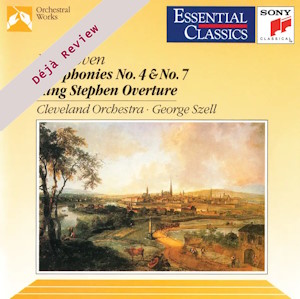
Déjà Review: this review was first published in September 2007 and the recording is still available.
Ludwig van Beethoven (1770-1827)
Symphony No 4 in B-flat major, Op 60
Symphony No 7 in A major, Op 92
Overture to King Stephen, Op 117
Cleveland Orchestra/George Szell
rec. 1960-67. ADD
Presto CD
Sony Classical SBK48158 [74]
For some reason, when Sony withdrew its Essential Classics catalogue from circulation and began to reissue the range in a newly generic livery, this disc from Szell’s classic Beethoven cycle never managed to find its way back onto the shelves. Why Sony would have reissued the rest of the cycle and left these performances out is a mystery. It is certainly not a question of quality, as these recordings are among the best in Szell’s cycle. Perhaps it was overlooked in the course of the merger of Sony and BMG. Perhaps it was a ploy to frustrate collectors into forking out for the “Original Jackets” box of the symphonies. Whatever the reason, if you began collecting the Essential Classics releases and missed this disc while it was still available, then you owe it to yourself to snap it up now.
Often when listening to Beethoven recordings from the past, one needs to adjust one’s mindset slightly. Beethoven, in those days, tended to be a heavy and heroic establishment figure, rather than reinvigorated revolutionary we are accustomed to hearing today, thanks to the efforts of the period performance movement. Not so with Szell. His cycle may be roughly contemporary with Karajan’s set with the Berlin Philharmonic, but he elicits a lighter, crisper sound from his Clevelanders that is much more in line with the Beethoven we are now used to.
There is a received wisdom that Szell’s lighter and pacier approach to Beethoven was essentially Toscanini’s approach in stereo sound. This is not at all the case. Szell was certainly particular when it came to precision and clarity of articulation, but he also balances the power of Beethoven with the composer’s humour and delicacy.
Both the fourth and the seventh symphonies receive excellent performances here, shaped with characteristic thought for structure, rhythmic pulse and close attention to dynamic contrasts. Tempi are superbly judged in both performances. Szell is never too quick, and never drags. The final movement of the fourth is the only place where I felt a little more pace was warranted, though it remains rhythmically pointed and precisely articulated.
There is plenty of mystery to the atmosphere of the introduction to the fourth’s first movement. It almost sounds like Berlioz. Then the allegro vivace that follows explodes into joyful existence. The Cleveland Orchestra bring considerable brio to this performance and you cannot help being dazzled as they point up contrasts between the lyrical and the rambunctious in Beethoven’s score. The adagio has great beauty but remains rhythmically taut. In Szell’s hands it is delectably dance-like. The scherzo is actually quite funny, with the questioning woodwinds quizzing the cavorting strings.
Of modern readings of this symphony, I find Vänska’s to be the most satisfying and the one which, more than any other I have heard, makes this symphony sound like an integrated whole, fully the equal of – though very different to – the fifth, rather than a brilliant experiment in rhythmic contrasts and orchestral colouring. Haitink’s dancing account with the LSO is also superb – one of the best recordings of his cycle on LSO Live. Szell’s performance is just as good, and any sonic reservations are amply offset by the excellence of his orchestra.
The opening of the first movement of the seventh again demonstrates Szell’s ability to balance the power of these symphonies with sensitivity. He hits the accents hard, though, and once past the poco sostenuto introduction, the vivace is terrifically exciting. As in the fourth, he brings gravitas and integrity to the “slow” movement (if a flowing allegretto can be said to be slow). The scherzo sparkles and the final allegro con brio dances. This is a wonderful performance, and the playing of the Cleveland Orchestra is incredible. The whooping of the horns and the buzz of the strings at the symphony’s close is exhilarating.
Of course there are many other great sevenths in the catalogue. Carlos Kleiber’s recording with the Vienna Philharmonic remains unique in it power and drive, and of recent recordings Haitink’s recent effort on LSO Live, like his fourth, is one of the highlights of his cycle – exciting and involving from first note to last. Szell is worth hearing, though. More than that, in bringing out Beethoven’s lyricism without sacrificing anything in power, he has something distinctive to say.
The overture to King Stephen makes an excellent encore. Szell’s reading has plenty of sparkle and is never rushed, though the recorded sound is a bit flat and brash. To be honest, all of these recordings are beginning to show their age, but the slightly dry acoustic is no great hindrance and helps the precision of the orchestra hit home all the harder.
In short, these performances are excellent. There are others in the catalogue that match the individual readings, but as a coupling of symphonies 4 and 7, this disc is unbeatable.
Tim Perry
Buying this recording via a link below generates revenue for MWI, which helps the site remain free


















